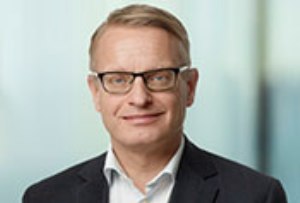Shares fall 20% at Ericsson following profit warning and news it is cutting 3,000 jobs in Sweden

Jan Frykhammar, Ericsson’s interim CEO
The bad news keeps piling up for Ericsson. Last week the Sweden-based giant reported that it intends to cut its 16,000 Swedish workforce by 3,000 positions in production, research & development (R&D), as well as sales and administration. Yesterday the Sweden-based company gave an interim report that sales fell 14% in Q3.
The drop in sales earnings is said to be due to weak broadband demand. As Jeremy Cowan reports, a further deterioration is anticipated by the 140-year-old company. Consequently, in a tough day following the profit warning, it lost 20.8% of its market value in U.S. trading, bringing the stock to an eight-year low. (Also see our report: Hans Vestberg steps down as Ericsson CEO.)
Gross margin also declined to 28% (34% in 2015) following lower volumes in Segment Networks, lower mobile broadband capacity sales, and a higher share of services sales.
The job cuts will be a combination of voluntary and forced reductions as well as other measures such as outsourcing. Ericsson intends to make significant reductions in operations at home in Borås and Kumla, consolidating to fewer production sites and continued work with partners. The company is already in talks on this with trade unions. Globally, the company employed 115,000 people in 2015.
Interim CEO, Jan Frykhammar, said that the measures taken are part of the ongoing cost and efficiency programme. Ericsson added, however, that it intends to recruit staff for about 1,000 new research & development (R&D) positions in Sweden over the coming three years.
The ongoing cost and efficiency programme will primarily impact production, but also parts of R&D as well as group and support functions. In recent years Ericsson says it has been driving “a transformation of the company to meet fast technology shifts and the digitalisation of the telecom industry as well as other industries”.
Jan Frykhammar, president and interim CEO, Ericsson said: “Ericsson is going through a large transformation. We continue to have a strong focus on R&D, and since many years, most Ericsson employees work in software development and services, rather than hardware production. The measures are necessary to secure Ericsson’s long-term competitiveness as well as technology and services leadership.”
Of the proposed reduction of 3,000 positions, approximately 1,000 positions will go in production, and 800 in R&D, while around 1,200 will be lost in other operations.
The proposed reductions will impact operations on the following sites in Sweden: Borås, Göteborg, Karlskrona, Kumla, Linköping and Stockholm. Ericsson intends to make significant reductions of operations in Borås and Kumla. The proposed reductions are intended to be met through a combination of voluntary and forced reductions as well as other alternatives such as outsourcing.
Ericsson will also make general cost reductions and take out external costs, primarily by reducing the number of consultants in Sweden by 900, but also through general reductions in operating expenses.
Sweden is the base for Ericsson’s R&D in radio technology and 5G. It has invested SEK7 billion ($ 0.79 billion) in three global ICT centers supporting R&D operations and forming the base for new digital business models. Two of them are in Sweden, in Rosersberg and in Linköping, strengthening Sweden’s role as a platform for R&D in Ericsson.
Ulf Ewaldsson, chief strategy and chief technology officer, said: “We have a clear goal that our R&D in Sweden should be world-leading, not least in next generation systems. In the short term, we have to reduce the number of positions in R&D, primarily within administrative roles. At the same time, our intention is to bring in new competence in new technologies. Therefore, we intend to recruit approximately 1,000 engineers in Sweden, primarily from universities, over the coming three years.”
Production in telecom has changed significantly over the past decade with smaller products and a more efficient production – manufacturing time per radio unit has been reduced by more than half. Higher volatility in production volumes has increased the need for flexibility and using partners has become more important. As a consequence, Ericsson is consolidating its own production to fewer sites globally.
The cost in sales and administration will be reduced as a result of the new company structure introduced July 1, 2016, with the aim to create a more efficient and purpose-built organisation to meet the needs of different customer segments and more quickly seize business opportunities.
 Union consultations will have a step-by-step approach and, for the majority of the operations, is expected to be concluded during the first quarter of 2017. The process related to the operations in Borås and Kumla is expected to be concluded during the second half of 2017.
Union consultations will have a step-by-step approach and, for the majority of the operations, is expected to be concluded during the first quarter of 2017. The process related to the operations in Borås and Kumla is expected to be concluded during the second half of 2017.
Cost and efficiency programme
The cost and efficiency programme, targeting savings of SEK9 billion ($ 1.02 billion) during 2017, is progressing according to plan. In addition, the company announced on July 19 this year additional activities to reduce the annual run rate of operating expenses, excluding restructuring charges, to SEK53 billion ($ 6.01 billion). in the second half of 2017.
This is to be compared with SEK63 billion($ 7.15 billion) for full-year 2014 and equates to double the previously targeted savings in operating expenses. At the same time, the company announced its intention to intensify activities to reduce cost of sales and adapt operations to a weaker mobile broadband market
Total restructuring charges for 2016 are, as previously communicated, estimated at SEK4-5 billion ($ 0.57 billion approx).
Comment on this article below or via Twitter @IoTGN

